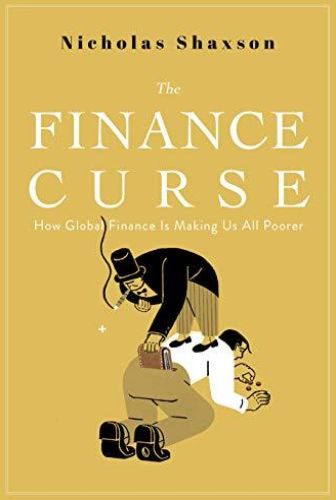Financial journalist Nicholas Shaxson offers an impassioned, detailed indictment of neoliberalism.

Private Profit, Private Wealth
In this powerful appeal for reform, renowned financial journalist Nicholas Shaxson explains how nations beset with the “finance curse” fall into economic malaise and become vulnerable to social division and authoritarianism. In economies with an overabundance of finance, billionaires hide their wealth, private equity firms exploit businesses and governments court corporate investment.
Shaxson’s theme is not new, but his easy-to-follow style provides a compelling, investigative journey into some significant corners of finance.
Too Strong
Shaxson cites how, in post-World War II America, corporate leaders sought to make a profit, provide well-paying jobs and contribute taxes to support infrastructure such as roads and schools. The size of the US financial sector then amounted to a single year’s GDP.
Financialization is a central part of the finance curse.Nicholas Shaxson
But in a financialized economy, he argues, those at the top amass wealth and power, and perpetuate a system that serves only them. America’s transition to financialization started in the 1970s, when high inflation mainstreamed neoliberal economics, which holds that unfettered markets best serve society. The government deregulated industries, privatized businesses and globalized commerce. Companies began to equate maximum profits with social responsibility and a healthy economy. By 2019, Shaxson notes, the US financial sector had grown to equal five years of US GDP.
Whole swathes of the political classes have turned their attention away from the tough slog of fostering a stronger manufacturing sector or creating a level playing field.Nicholas Shaxson
Shaxson makes the case that financialization undermines democratic institutions, justifies inequality and racial and gender discrimination, and leaves most people worse off.
Government Competition
Proponents of neoliberalism believe that countries should compete for the tax revenue and highly paid jobs of financial institutions and corporations. Local politicians bestow tax breaks; national or international firms get the handouts, while individuals and smaller businesses suffer from reduced public service budgets. Shaxson highlights how in Kansas, for example, lower corporate taxes led to school closings and service cuts.
Cutting taxes is good. Why? Because it’s ‘competitive.’ Why is ‘competitive’ good? Because it means lower taxes!Nicholas Shaxson
A 2016 study estimated the average cost to states of luring big business was $658,000 for each job created.
The City of London
The City of London – Great Britain’s equivalent to Wall Street – proves quite deregulated and contemptuous of ethical boundaries, Shaxson avers.
In Britain…senior financiers are effectively above the law.Nicholas Shaxson
In the 1970s, for example, the City recirculated petrodollars, which contributed to the 1980s third-world debt debacle. American mortgage debt drove the 2008 financial crisis, but London-based trading divisions booked the most harmful credit default swaps. For example, the collapse of AIG, the US insurance giant, resulted from risks taken by its London subsidiary.
By the time the [2008] financial crisis hit, New York financiers were calling London the ‘Guantanamo Bay’ of global finance, where they could do things forbidden at home.Nicholas Shaxson
The City has long been a safe haven for tax evasion, money laundering and fraudulent securities.
Tax Havens, Trust Funds and Private Equity
Shaxson details how The Bahamas and the Cayman Islands, for example, offer individuals and companies secrecy and tax avoidance. Trust funds obscure ownership and tax liability, and they perpetuate large inheritances, keeping capital tied up in wealthy families. But secretive dealings and losses of tax revenue erode “equality of opportunity” and undermine democracy.
There are considerable similarities between trusts and tax havens…trusts are like personalized tax havens, mechanisms that help wealthy people or institutions to shield their assets from the rules that bind the rest of us.Nicholas Shaxson
Private equity (PE) needn’t conform to laws that regulate publicly traded corporations. A PE firm can purchase a successful company and load it with debt. The liability remains with the company’s employees, creditors and vendors; the PE firm receives proceeds and profits.
Firms bought out by private equity tended to have been more productive and faster growing than their peers before the buyouts; afterward, jobs and earnings tended to fall, and significantly so.Nicholas Shaxson
A PE firm deploys tax havens, company splits and corporate relocations to increase returns. Or it can force the acquired company to use, at extortionate prices, services or subcontractors linked to the PE firm.
Impoverished Rural Communities
Shaxson explains how, starting in the 1950s, the Tyson company industrialized chicken production, vertically integrating the supply chain. The company entered into exclusive contracts with chicken farmers, giving them chicks to raise using only Tyson feed. Tyson then set up a shell company, saving tens of millions of dollars in taxes. Over time, Tyson shifted more risk to farmers, whose incomes shrank. Its corporate model for maximizing profits spread to other food sectors.
For the farmers, there was an almighty catch: they couldn’t buy their chicks or inputs from, or sell the slaughter-ready chickens to, anyone else [but Tyson]. Nicholas Shaxson
Large, vertically integrated companies have consolidated hog farms in Iowa into giant operations. Farmers bear the risk of raising the animals but earn little after operating costs and loan payments. Transportation, machinery and veterinary services come from outside the local community, as profits flow to the big companies. Local incomes drop, commercial and real estate values suffer, and the property tax base that maintains roads, schools and other critical infrastructure erodes.
Reclaim Democratic Power
Economic growth has faltered as American well-being has suffered.
The real economic dividing line today isn’t so much between Democrats and Republicans as between those who favor rigged markets and the finance curse, and those who oppose them.Nicholas Shaxson
Countries should tax and police finance. A clean-up of tax havens and trusts is long overdue, because finance should serve society.
Impassioned Explanation
Shaxson breaks down the pernicious aspects of neoliberalism and financialization by depicting in detail their processes and – with equal relevance – their effects on citizens caught in the gears of modern finance. Few authors combine Shaxson’s financial expertise, compassion, and clear, strong voice. Laypeople and even those in finance will gain much insight – and perhaps develop a righteous rage – from Shaxson’s granular depiction of democracy’s erosion in the service of inconceivable profits for those who built the system and sustain it solely for their benefit. Students in particular will find here revelatory, accessible knowledge seldom presented so well elsewhere.
Nicholas Shaxson is also the author of Treasure Islands and Poisoned Wells. Similar works on parallel subjects include The Panama Papers by Frederik Obermaier and Bastian Obermayer, The Triumph of Injustice by Emmanuel Saez and Gabriel Zucman, and The Hidden Wealth of Nations by Gabriel Zucman.






